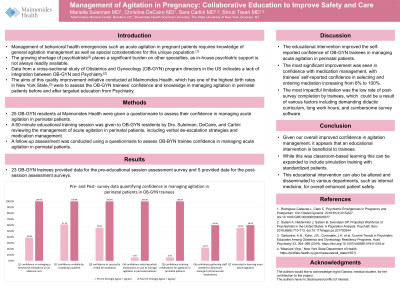Women's Mental Health
Session: Poster Session
(212) Management of Agitation in Pregnancy: Collaborative Education to Improve Safety and Care

Trainee Involvement: Yes

mariella Suleiman, MD (she/her/hers)
Resident Physician
Maimonides Medical Center
BROOKLYN, New York, United States
Christine DeCaire, MD
Psychiatry Resident
Maimonides Medical Center
Brooklyn, New York, United States
Sara V. Carlini, MD
Psychiatrist, Consultation-Liaison Psychiatry Department
Maimonides Medical Center
Brooklyn, New York, United States.jpg)
Shruti Tiwari, M.D.
Director of Consultation-Liaison Psychiatry
Maimonides Medical Center
Long Island City, New York, United States
Presenting Author(s)
Co-Author(s)
1. Rodriguez-Cabezas L, Clark C. Psychiatric Emergencies in Pregnancy and Postpartum. Clin Obstet Gynecol. 2018;61(3):615-627. doi:10.1097/GRF.0000000000000377 2. Satiani A, Niedermier J, Satiani B, Svendsen DP. Projected Workforce of Psychiatrists in the United States: A Population Analysis. Psychiatr Serv. 2018;69(6):710-713. doi:10.1176/appi.ps.201700344 3. Garbarino, A.H., Kohn, J.R., Coverdale, J.H. et al. Current Trends in Psychiatric Education Among Obstetrics and Gynecology Residency Programs. Acad Psychiatry 43, 294–299 (2019). https://doi.org/10.1007/s40596-019-01018-w 4. “Measure View.” New York State Department of Health, https://profiles.health.ny.gov/measures/all_state/16511.
Background: Management of behavioral health emergencies such as acute agitation in pregnant patients requires knowledge of general agitation management as well as special considerations for this unique population [1]The growing shortage of psychiatrists [2] places a significant burden on other specialties, who may have to manage complex psychiatric conditions or behavioral health emergencies without the support of in-house psychiatry. Data from a cross-sectional study of Obstetrics and Gynecology (OB-GYN) program directors in the US indicates an overwhelming shortage of psychiatric education throughout OB-GYN residency training attributed primarily to a lack of integration between OB-GYN and Psychiatry [2]. The aims of the present quality improvement initiative, to be conducted in a community hospital in Brooklyn with one of the highest birth rates in New York State [3], are to assess the OB-GYN trainees’ confidence and knowledge level in managing agitation in pregnant patients before and after targeted education from the Psychiatry department for the purpose of developing integrated training in this crucial skill.
Method: OB-GYN residents and fellows in a Brooklyn-based community hospital will be given a questionnaire to assess their confidence and knowledge level in managing behavioral emergencies in pregnant and post-partum patients. A simulation of an ‘agitation patient’ scenario with a standardized patient will be created based on pre-questionnaire data. Training in verbal de-escalation and management of acute agitation will be provided to accompany simulation. A follow-up assessment will be conducted using a questionnaire to assess confidence and knowledge level in managing behavioral health emergencies. Data from the pre- and post- questionnaires will be analyzed and results presented.
Results: There are a total of 30 OB-GYN trainees in our program. The intervention described in the methods is ongoing, and as such, results are pending.
Conclusion: Collaborative education with psychiatry for OB-GYN trainees is expected to improve the confidence of trainees in managing acute agitation in pregnant patients and thereby improve patient safety.
References:

